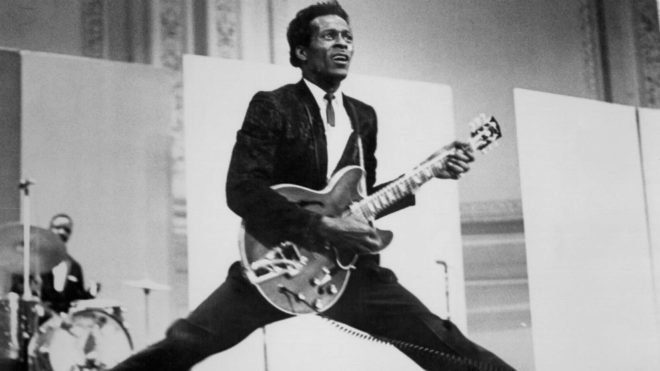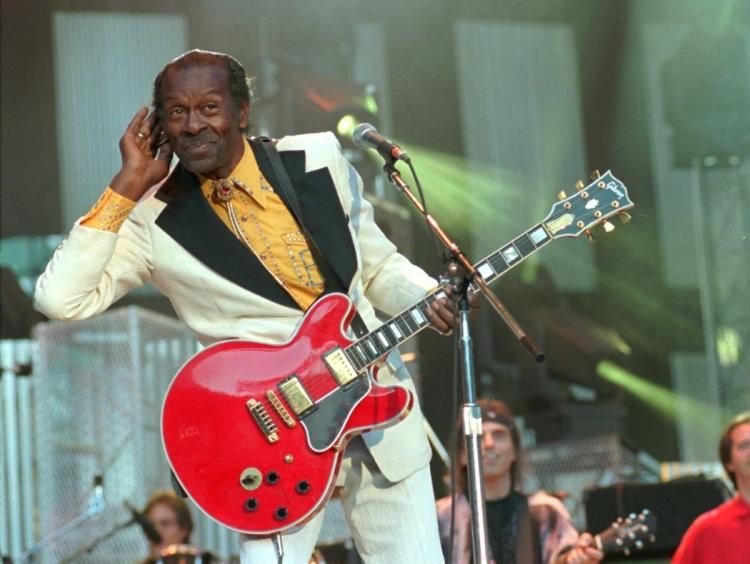Chuck Berry, who duck-walked his way into the pantheon of rock ‘n’ roll pioneers as one of its most influential guitarists and lyricists, creating raucous anthems that defined the genre’s sound and heartbeat, died on Saturday at his Missouri home. He was 90.
Police in St. Charles County, outside St. Louis, said they were called to Berry’s home by a caretaker and found him unresponsive. Efforts to revive him failed and he was pronounced dead at 1:26 p.m. local time.

Considered one of the founding fathers of rock ‘n’ roll, Charles Edward Anderson Berry was present at its infancy in the 1950s and emerged as its first star guitarist and songwriter – a nearly 30-year-old black performer whose style electrified young white audiences and was emulated by white performers who came to dominate American popular music.
Although Elvis Presley was called the king of rock ‘n’ roll, that crown would have fit just as well on Berry’s own carefully sculpted pompadour.
Berry hits such as “Johnny B. Goode,” “Roll Over Beethoven,” “Sweet Little Sixteen,” “Maybellene” and “Memphis” melded elements of blues, rockabilly and jazz into some of the most timeless pop songs of the 20th century.
He was a monumental influence on just about any kid who picked up a guitar with rock star aspirations – Keith Richards, Paul McCartney, John Lennon and Bruce Springsteen among them.
Bob Dylan called Berry “the Shakespeare of rock ‘n’ roll,” and he was one of the first popular acts to write as well as perform his own songs. They focused on youth, romance, cars and good times, with lyrics that were complex, humorous and sometimes a little raunchy.
Both the Beatles and the Rolling Stones, as well as the Beach Boys and scores of other acts – even Elvis – covered Berry’s songs.

“If you tried to give rock ‘n’ roll another name,” Lennon once said, “you might call it ‘Chuck Berry’.”
“GROWING OLD”
His death came five months after Berry announced plans to release his first album of new music in 38 years some time in 2017 – a collection of mostly original material recorded and produced by Berry, titled “Chuck” and dedicated to his wife of 68 years, Themetta “Toddy” Berry.
Punchy wordplay and youth-oriented subject matter earned him the nickname “the eternal teenager” early in his career. His legacy was tarnished, however, by his reputation as a prickly penny-pincher and various run-ins with the law, including sex-related offenses after he achieved stardom.
Berry came along at a time when much of the United States remained racially segregated, but it was hard for young audiences of any color to resist a performer who delivered such a powerful beat with so much energy and showmanship.

Berry said he performed his signature bent-knee, head-bobbing “duck walk” across more than 4,000 concert stages. He said he invented the move as a child in order to make his mother laugh as he chased a ball under a table.
Some critics suggested it was his former pianist, Johnnie Johnson, who composed the tunes while Berry only penned the lyrics. Johnson sued Berry in 2000 for song royalties, saying they were equal collaborators on many of the hits, but the case was dismissed on grounds that the statute of limitations had expired.
Berry’s reputation for being greedy and grouchy was evident in the 1987 documentary “Hail! Hail! Rock and Roll,” which focused on a 60th-birthday concert that Keith Richards organized for him. The filmmakers said Berry refused to show up for production each day unless given a bag of cash.
Berry was born Oct. 18, 1926, the third of six children whose father was a contractor and church deacon and whose mother was a schoolteacher. They lived in a relatively prosperous black section of St. Louis known as the Ville.
Illustrating his influence, a recording of “Johnny B. Goode” was included in a collection of music sent into space aboard the unmanned 1977 Voyager I probe to provide aliens a taste of Earth culture.
Feature Image Source: Reuters (File Photo)

















